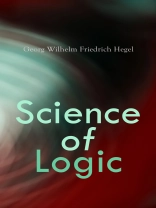Science of Logic is the work in which Georg Wilhelm Friedrich Hegel outlined his vision of logic. For Hegel, the most important achievement of German idealism, starting with Immanuel Kant and culminating in his own philosophy, was the argument that reality is shaped through and through by thought and is, in a strong sense, identical to thought. Thus ultimately the structures of thought and being, subject and object, are identical. Since for Hegel the underlying structure of all of reality is ultimately rational, logic is not merely about reasoning or argument but rather is also the rational, structural core of all of reality and every dimension of it. Thus Hegel’s Science of Logic includes among other things analyses of being, nothingness, becoming, existence, reality, essence, reflection, concept, and method. As developed, it included the fullest description of his dialectic.
Giới thiệu về tác giả
Georg Wilhelm Friedrich Hegel (1770-1831) was a German philosopher and an important figure of German idealism. He achieved recognition in his day and—while primarily influential in the continental tradition of philosophy—has become increasingly influential in the analytic tradition as well. Although Hegel remains a divisive figure, his canonical stature in Western philosophy is universally recognized.












